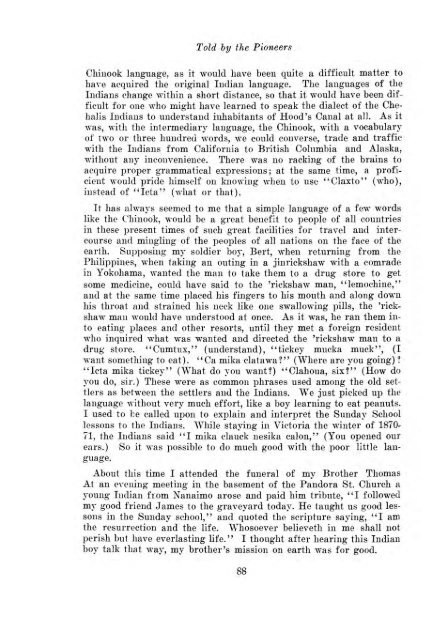Told by the Pioneers - Washington Secretary of State
Told by the Pioneers - Washington Secretary of State
Told by the Pioneers - Washington Secretary of State
You also want an ePaper? Increase the reach of your titles
YUMPU automatically turns print PDFs into web optimized ePapers that Google loves.
<strong>Told</strong> <strong>by</strong> <strong>the</strong> <strong>Pioneers</strong><br />
Chinook language, as it would have been quite a difficult matter to<br />
haye acquired <strong>the</strong> original Indian language. The languages <strong>of</strong> <strong>the</strong><br />
Indians change within a short distance, so that it would have been difficult<br />
for one who might have learned to speak <strong>the</strong> dialect <strong>of</strong> <strong>the</strong> Chehalis<br />
Indians to understand inhabitants <strong>of</strong> Hood's Canal at all. As it<br />
was, with <strong>the</strong> intermediary language, <strong>the</strong> Chinook, with a vocabulary<br />
<strong>of</strong> two or three hundred words, we could converse, trade and traffic<br />
with <strong>the</strong> Indians from California to British Columbia and Alaska,<br />
without any inconvenience. There was no racking <strong>of</strong> <strong>the</strong> brains to<br />
acquire proper grammatical expressions; at <strong>the</strong> same time, a pr<strong>of</strong>i.<br />
cient would pride himself on knowing when to use "Claxto" (who),<br />
instead <strong>of</strong> "leta" (what or that).<br />
It has always seemed to me that a simple language <strong>of</strong> a few words<br />
like <strong>the</strong> Chinook, would be a great benefit to people <strong>of</strong> all countries<br />
in <strong>the</strong>se present times <strong>of</strong> such great facilities for travel and intercourse<br />
and mingling <strong>of</strong> <strong>the</strong> peoples <strong>of</strong> all nations on <strong>the</strong> face <strong>of</strong> <strong>the</strong><br />
earth. Supposing my soldier boy, Bert, when returning from <strong>the</strong><br />
Philippines, ·when taking an outing in a jinrickshaw with a comrade<br />
in Yokohama, wanted <strong>the</strong> man to take <strong>the</strong>m to a drug store to get<br />
some medicine, could have said to <strong>the</strong> 'rickshaw man, "lemochine,"<br />
and at <strong>the</strong> same time placed his fing'ers to his mouth and along down<br />
his throat and strained his neck like one swallowing pills, <strong>the</strong> 'rickshaw<br />
man would have understood at once. As it was, he ran <strong>the</strong>m into<br />
eating places and o<strong>the</strong>r resorts, until <strong>the</strong>y met a foreign resident<br />
who inquired what was wanted and directed <strong>the</strong> 'rickshaw man to a<br />
drug store. "Cumtux," (understand), "tickey mucka muck", (I<br />
want something to eat). "Ca mika clatawa1" (Where are you going)?<br />
"Icta mika tickey" ("What do you want?) "Clahoua, six1" (How do<br />
you do, sir.) These were as common phrases used among <strong>the</strong> old settlers<br />
as between <strong>the</strong> settlers and <strong>the</strong> Indians. vVe just picked up <strong>the</strong><br />
language without very much effort, like a boy learning to eat peanuts.<br />
I used to be called upon to explain and interpret <strong>the</strong> Sunday School<br />
lessons to <strong>the</strong> Indians. ·While staying in Victoria <strong>the</strong> winter <strong>of</strong> 1870<br />
71, <strong>the</strong> Indians said "I mika clauck nesika calon, " (You opened our<br />
ears.) So it was possible to do much g'ood with <strong>the</strong> poor little language.<br />
About this time I attended <strong>the</strong> funeral <strong>of</strong> my Bro<strong>the</strong>r Thomas<br />
At an en>ning meeting in <strong>the</strong> basement <strong>of</strong> <strong>the</strong> Pandora St. Church a<br />
young Indian from Nanaimo arose and paid him tribute, "I followed<br />
my good friend James to <strong>the</strong> graveyard today. He taught us good lessons<br />
in <strong>the</strong> Sunday school," and quoted <strong>the</strong> scripture saying, "I am<br />
<strong>the</strong> resurrection and <strong>the</strong> life. vVhosoever believeth in me shall not<br />
perish but have everlasting life." I thonght after hearing this Indian<br />
boy talk that way, my bro<strong>the</strong>r's mission on earth was for good.<br />
88
















